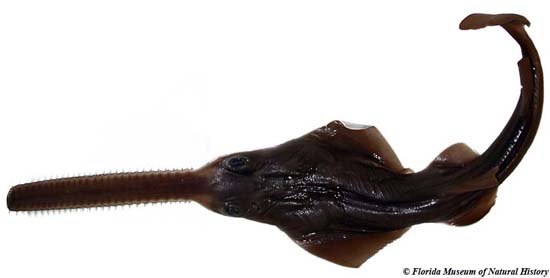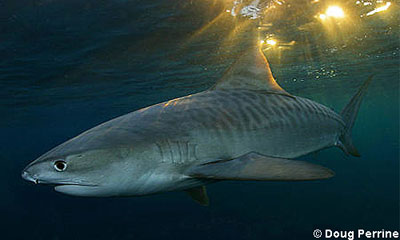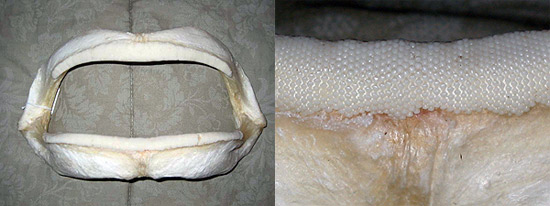Let’s look a little closer at sawfish parts, habits, and biology:
![]() No, sawfishes and all other fishes belonging to the class Chondrichthyes lack true bone, but rather have cartilaginous skeletons.
No, sawfishes and all other fishes belonging to the class Chondrichthyes lack true bone, but rather have cartilaginous skeletons.
Cartilage is a type of connective tissue strong enough to give support but softer than true bone. Cartilage is found in the human ear and nose.
Due to cartilage being softer than bone, it is very rare to find complete fossil remains of elasmobranchs.
Male sawfishes have paired intromittent organs called claspers. Claspers are modifications of the pelvic fins and are located on the inner margin of the pelvic fins. Females do not have claspers.
They have pectoral fins (fused to the head/trunk), pelvic fins, two dorsal fins, and a caudal (tail) fin. Like the great majority of rays, sawfishes lack an anal fin.
Sawfishes have both a first dorsal fin and a second dorsal fin of roughly equal sizes. As far as the caudal fin is concerned, one species has both lobes well-developed, two species (plus the nominal species, Pristis pristis) has well-developed upper lobe and only a moderately developed lower caudal lobe, and three species have only a well-developed upper caudal fin lobe.
Sawfish skin, not unlike shark skin, feels exactly like sandpaper because it is made up of tiny teeth-like structures called placoid scales, also known as dermal denticles.
These scales point towards the tail and helps to reduce friction from surrounding water when the shark swims. Because of this, if someone rubbed the skin from the head towards the tail, it would feel very smooth. In the opposite direction it feels very rough like sandpaper. As the sawfish grows, the placoid scales do not increase in size, but rather the sawfish grows more scales.
Sawfishes are “ovoviviparous”, meaning that young sawfishes grow in eggs contained within the mother. After the embryos are fully developed, the mother sawfish gives live birth with an average litter size of about 8 pups.

It has been estimated that these animals live up to 25 to 30 years, reaching maturity at 10 years.
![]()
Sawfishes feed on small fishes and invertebrates that can be ingested whole through the mouth. They only feed on prey that can fit into their small mouths since they are unable to tear chunks off prey items with their toothy saw.
Adult sawfishes have very few predators. Crocodiles, large sharks, and even marine mammals such as dolphins are known predators of juvenile sawfishes. A large piece of an adult sawfish saw was reported from the stomach contents of a large tiger shark.

Ten to twelve rows of teeth are located in jaws of the smalltooth sawfish. The upper and lower jaws have approximately 88-128 and 84-176 teeth respectively. The teeth are rounded anteriorly and have a blunt cutting posterior edge.

Sawfishes are sometimes confused with sawsharks (Family Pristiophoridae).
Sawsharks also have a saw, however sawfishes are a type of ray and have their gill opening on their ventral side, while sawsharks are sharks and have gill opening on the side of their body. Sawsharks live in deep offshore waters in many parts of the world while sawfish live in shallower coastal waters. Sawsharks are also considerably smaller than sawfishes, reaching only 5 feet in length.